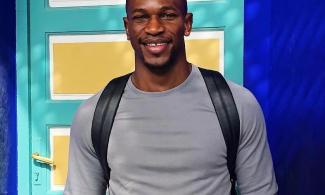
“In August of 2007, I arrived in Baltimore a 16-year-old boy with the dream that I would one day become a physician and oh what a journey it has been. My pre-med advisor told me that I had a 1 in 1000 chance of getting into medical school but I had God to adjust the odds on my behalf. Twelve years later, just like the sign behind me reads, that dream has come true.”
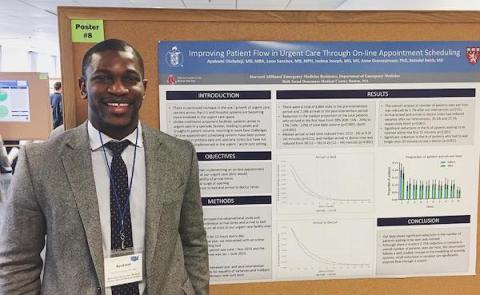
Studying medicine and surgery in the United States of America is both academically and financially demanding. It’s hard for international students to get into medical schools due to several challenges. In this interview with SaharaReporters, Nigerian doctor and MBA holder, Ayobami Olufadeji, who recently completed his studies at Beth Israel Deaconess Medical Center, a Harvard Affiliated Emergency Medicine Residency Program, narrates his 12-year academic journey.
Growing Up
I grew up in Mulero, an Agege suburb in Lagos. I don’t want to paint a picture that we were the poorest but we were poor enough that it affected the type of meals we had. We lived in a face-me-I-face-you style apartment. My dad was jobless for a while. Even though we were poor, my parents gave education a priority. They would rather pay for my school fees than have us buy meat to spice up our meals. We were in Agege for a while. My dad eventually got a good job around 1997/1998 and so we moved to Bonny Island in Rivers State a few years later. My dad got a job with the NLNG and I was able to attend Jephthah Comprehensive Secondary School in Port Harcourt, a boarding school.
One of the important things about boarding school was that it taught me to be regimented. At 6 am, the bell rang and everyone woke up for the daily routines. This experience made me embrace the value of sticking to a schedule which has helped keep me regimented.
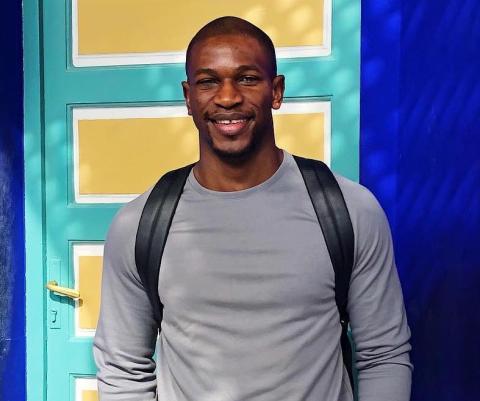
Opting for medicine
I chose to be a doctor after an encounter at our house. One day, I came back from school in Agege and met people mourning in our compound. I heard that our neighbor had a headache and died. I could not understand how a headache would kill someone. I asked why that happened and my mum said it happened “because we don’t have many doctors around.” She then said, “maybe you can be a doctor for us.” While other children had dreams to become Michael Jackson, or Jay Jay Okocha, or an engineer, or lawyer, or even Fela, the natural progression for me was to become that “doctor for us”.
Migrating to the US at 16
I had always wanted to become a doctor and I had heard about strikes in Nigerian universities. I knew that if I had got into a Nigerian university it might take forever to finish. I also wanted a degree that would be universal, so the US was my desired destination. When I was completing my secondary school, I decided to take all the international entrance exams. I took the SAT exams two times but was lucky that my second score was decent enough that I was invited to the John Hopkins University in Baltimore for a conference. During that conference, I was looking through a book; Barrons list of colleges and found that the University of Maryland Baltimore County was nearby. It was a smaller campus and I thought it might be a better fit for me. I arranged a visit to UMBC and a lady I will never forget, Michelle, helped me fill out the application form and waived the fees. I was given admission to study biological sciences from 2007 to 2011.
College challenges

Funding was a major challenge, not only for me but for other international students. When I got to America, one of the things I was told was that although my second SAT scores would have qualified me for a scholarship, I applied too late and they didn’t have any additional funding for international students.
I went to the President of my college and explained that if I didn’t get the scholarship I might have to leave UMBC. He initially offered his condolences and recommended cheaper schools in the area. By some miracle, he called me later that evening and said that after reviewing my grades from the first semester, he thought I had potential so he gave me a presidential scholarship. I remember that phone call as one of the moments that changed the course of my life. The scholarship did not cover all of my tuition but it was all the motivation I needed. I starting working two jobs on campus to pay for my room and board, and my parents paid for the tuition that wasn’t covered by the scholarship.
Around the time that I was applying to medical school, there were approximately 200 medical schools in the US and only 20 were taking international students. Of the 20, only about 5 were giving out substantial aid to international students. Like the SATs, I had to take the medical entrance exams twice. The first time I took it, I tried to cram for it and I ended up with a migraine that put me in the hospital. After a lot of prayer and counsel from mentors and family, I decided to take it again and did better. I was happy I got into an Ivy League school, Geisel School of Medicine at Dartmouth. My pre-med advisor had told me that I had a 1 in 1000 chance of getting into medical school but I had God to adjust the odds on my behalf.
The Harvard Programme
I did my residency in a Harvard program at the Beth Israel Deaconess Medical Center. The experience was mentally, emotionally and physically challenging. If you are not constantly reminding yourself of why you’re here in the first place and don’t have a good support system around you, it can be frustrating.
I will say it is probably one of the most challenging things that one would go through as a medical doctor. When you finish medical school and you get the MD behind your name, you’re not really a doctor because you’re unable to be the sole physician managing a patient in a real-life situation.
Residency is a very challenging experience because of the workload that you have to manage. It does not allow you much time for leisure and even when you are not at work, all you want to do is spend time with yourself. As with anything in life, you need a social support system and residency has a tendency to isolate you from your social circle.
You can’t even imagine the joys of my parents when I graduated. It was a long journey for me and for them. My dad would ask me often, “when will this thing finish?”
I am so grateful for the family that has carried me. They know that I needed physical, emotional, spiritual, mental support along the way and they have shown up at every turn. I could never thank them enough.
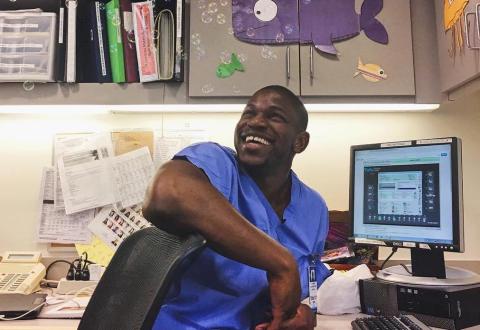
Managing stress
I cook a lot. Cooking is therapeutic for me. I came back from a challenging shift one day and although I was exhausted, I cooked and I felt better. It was interesting. Another day, I had a similar experience. I was exhausted so I decided to cook and I felt much better. Cooking for me has since become a good way to de-stress. I try my hand at anything in the kitchen, but I mostly cook Nigerian food. My favorite thing to eat is dodo or anything that involves plantain.
For those who chose to become doctors, medicine will continue to ask for more of your time. There will be days when you feel like not doing anything and not going out. Cooking has helped me to manage the stress well.
Returning to Nigeria
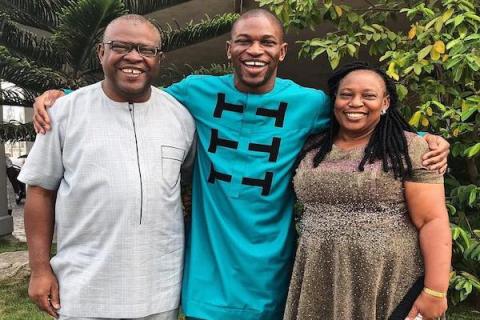
I am passionate about the healthcare system in Nigeria and look forward to being a part of solving some of the systemic issues that we face. However, at this time, I do not have plans to practice clinically in Nigeria yet. I worked at a healthcare system in Lagos and it was difficult to see the lack of resources to handle emergencies. Doctors in Nigeria who practice in this environment are the real superheroes. Imagine taking care of a patient you need blood for, and there is no bank in place so you have to solicit for blood. There are other ways I see myself getting involved in working in our system. Our health technology space is starting to grow and I’m involved in that through Digital Health Nigeria, an initiative I co-founded to support the health technology ecosystem. I’m currently working on a project to teach some emergency medical courses at home. Also thinking through ways we can equip pharmacies to serve better at the frontlines of entry into our healthcare system. I am really excited about the prospects of working in Nigeria.
Work-Life Balance
Medicine keeps demanding more and more from you and one of the decisions I have made is not to work full time starting this year. I plan to be in Nigeria every quarter so I get to spend time with my parents and to be home. Medical school has kept me away from my family and I hope to close that gap. At this time in my career, my family comes first.
Healthcare in Nigeria: Way Forward
We have started but we have work to do to deliver suitable emergency care in Nigeria. I know the Lagos State government has a notable ambulance system. I think there are some private companies in Abuja investing in the emergency response system as well.
Beyond emergency care, we need to figure out healthcare financing. I spent a good amount of time in business school trying to study and understand this and I know it is very complex. Healthcare is not cheap. Most Nigerians are not wealthy. How do we deliver quality care that’s affordable? Insurance companies are in the market and I commend them but we need insurance systems that work for the poor; that provide a solid safety net. We have a shortage of doctors in Nigeria, but there are opportunities to structure certificate programs that upskill nurses to close this labor gap. Finally, we need to focus on primary and urgent healthcare services. They are the entry point to any healthcare system and in my mind the low-hanging fruit for improvement in our country.